21 June 2022
At NDY, some of our best and brightest people have shared their reflections on what it is to be a female or an ally in engineering and construction, what they love about the job, and the conversations we need to have to ensure future generations don’t encounter the same roadblocks as those that went before them.
With engineers playing an exciting role in shaping our built environment, our designs need to include in-depth consideration of how people use spaces. With diversity of people comes a wide range of needs and uses. It stands to reason then, that an effective design team can’t consider all aspects of a design without first having diversity in the team.
It’s within our power then to be part of a solution that offers outstanding design alongside an equitable future for all.
Read the reflections of our team in full in the expandable entries below.
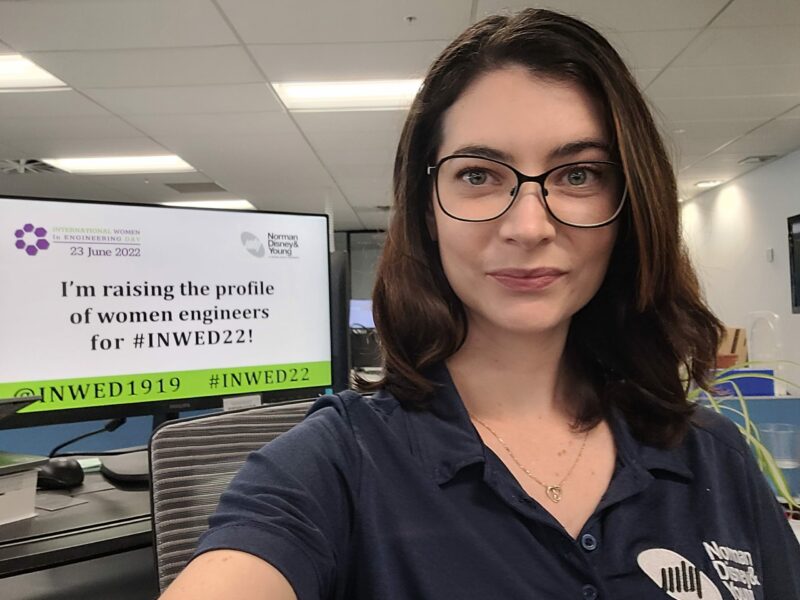
Why is gender parity important to you?
Gender parity in the workforce offers a business and projects diversity of thought and a culture of inclusivity.
What is the most innovative/exciting project you have done?
Meredith Connell (MC) – we delivered one of the first WELL certifications in New Zealand to the crown prosecutor law firm of Auckland. MC prioritise staff as their key asset and demonstrated to staff, stakeholders and the industry their commitment to occupancy health and wellbeing with pursuing this WELL certification of their office.
Why would someone at school/uni want to go into engineering? What are the benefits of working in the construction industry?
It’s a highly fulfilling career with many different avenues to apply your skills. We typically spend around 90% of our lives indoors, working in the construction industry means we get an opportunity to contribute to what those spaces look and feel like to the occupants and the wider community.
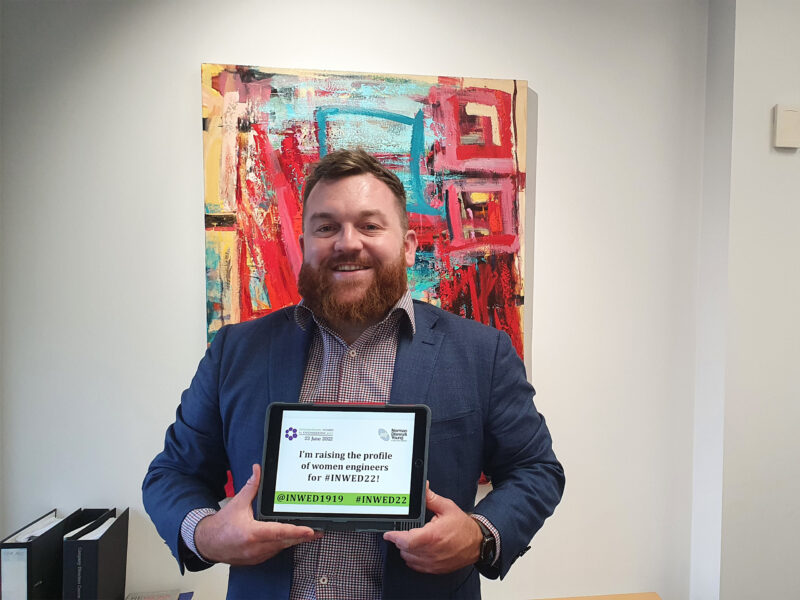
The hashtag this year is #ImagineTheFuture – what do you see the future of women in engineering being?
Organisations are waking up to the fact that diversity yields positive outcomes. I am confident that this realisation, coupled with significant investment in STEM opportunities for young women, will lead to improved representation within engineering, specifically in senior leadership roles.
What are the conversations you can have with your daughter to encourage participation in STEM careers?
My daughter is only three; however, I seek to ensure that she feels no limitation on what she might achieve in all of my interactions with her. I focus on encouraging her to ask questions about everything and anything; she is very inquisitive and inviting these questions nourishes that.
What conversations are you going to have to support women in engineering?
I will continue to advocate for women in engineering both within NDY and in the industry. In my conversations I will challenge negative behaviours, support inclusive policies and promote diversity of thought.
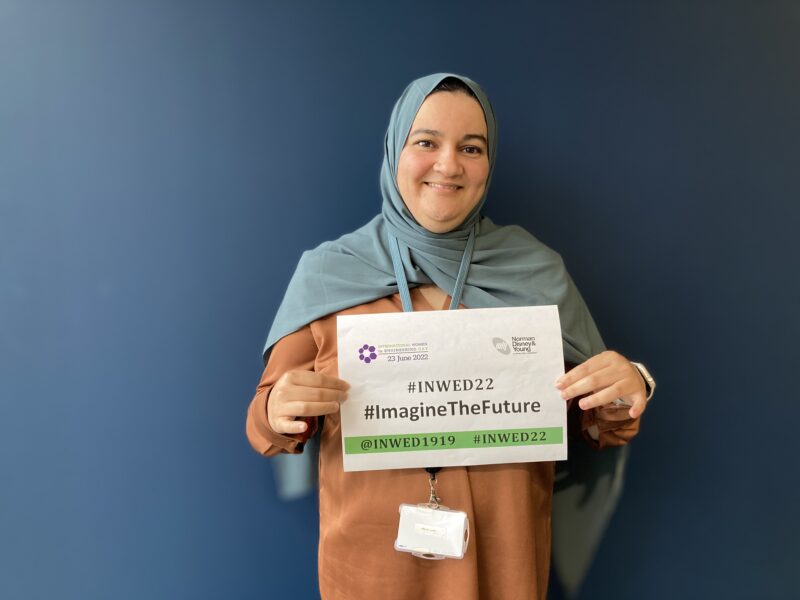
Why is gender parity important to you?
I have worked in construction since I graduated. And I have suffered from gender imparity. I was paid less than my peers, I didn’t have any of the benefits they had (phone, car) although I had the same responsibilities and was really engaged in fulfilling my duties. I also felt that it was unfair and tried to break the bias with no results. As a result, I had to quit. I believe it’s my performance and work that should define me not my gender.
The hashtag this year is #ImagineTheFuture – what do you see the future of women in engineering being?
I sincerely hope that women won’t be afraid to be engineers. I hope that they can believe they can have a brilliant career and not think to change it at some points. I hope companies will aim to support mum’s that are engineers into finding balance between their work and family duties.
What are the conversations you can have with your daughter/niece to encourage participation in STEM careers?
Be passionate, patient and don’t be afraid. You can do it.
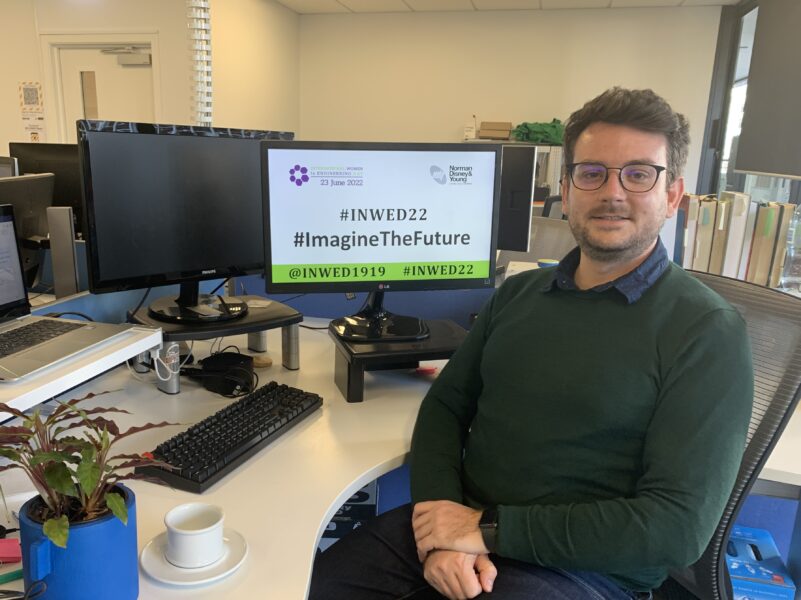
Why is gender parity important to you?
A diversity of people and strengths builds stronger project teams and an enjoyable work environment. I think everyone should have the opportunity to pursue careers that are fulfilling and rewarding, and we have work still to do to address ingrained prejudice and stereotypes.
The hashtag this year is #ImagineTheFuture – what do you see the future of women in engineering being?
I look forward to a future where I have a lot more female colleagues including in leadership positions, and where young women grow up in an environment where they are exposed to engineering as a valid and available career choice.
Why would someone at school/university want to go into engineering? What are the benefits of working in the construction industry?
There are a huge range of roles and opportunities in engineering, including roles that require different levels of technical focus, communication, collaboration, leadership. It’s exciting to see the results of your work as you travel around the city, and to work on projects which will have a positive impact on people’s lives.
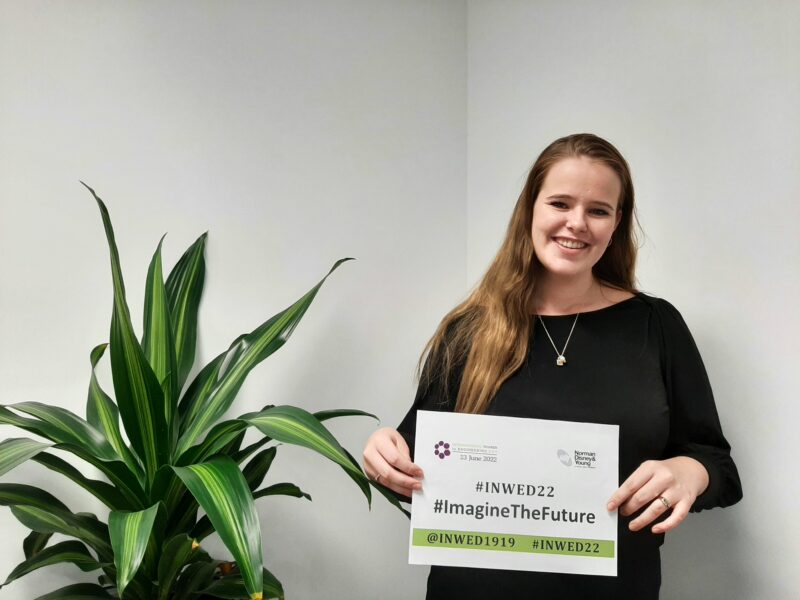
The hashtag this year is #ImagineTheFuture – what do you see the future of women in engineering being?
The future is female – a future of more women in industry and leadership positions who demonstrate work-family balance would be great to see.
Why is gender parity important to you?
Growing up with a twin brother, I have seen the differences between our opportunities and experiences to different things. Therefore, gender parity is important so that we can change the traditional gender norms and have equal opportunity for all no matter the gender.
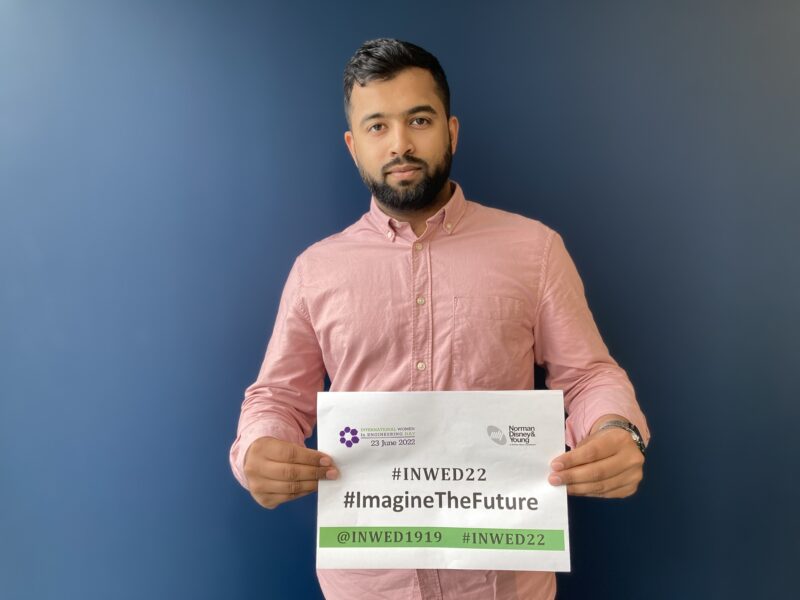
The hashtag this year is #ImagineTheFuture – what do you see the future of women in engineering being?
The future of women in engineering is very bright. We not only require more women in engineering but need more women in engineering. I think there is a huge gap to fill in the market, and the need for engineers in the UK is rising. It is a male dominated sector, however we are seeing a growing increase year by year of the number of women in engineering and construction.
What is the most innovative/exciting project you have done?
I have worked on multi-million pound projects from cinemas to cancer research hospitals. But my most exciting project is probably Battersea Power Station, because of its historical element and the way it is being refurbished. Keeping the 4 towers in place and redeveloping around it.
Why would someone at school/university want to go into engineering? What are the benefits of working in the construction industry?
The main reason I find is the reward and job satisfaction. Seeing your work come to life and benefiting the community. Engineering is at the forefront of finding methods to reduce carbon which is also the main talking point at this time. If anyone is to solve global warming issues whilst helping develop living standards and increased populations, it will be engineers.
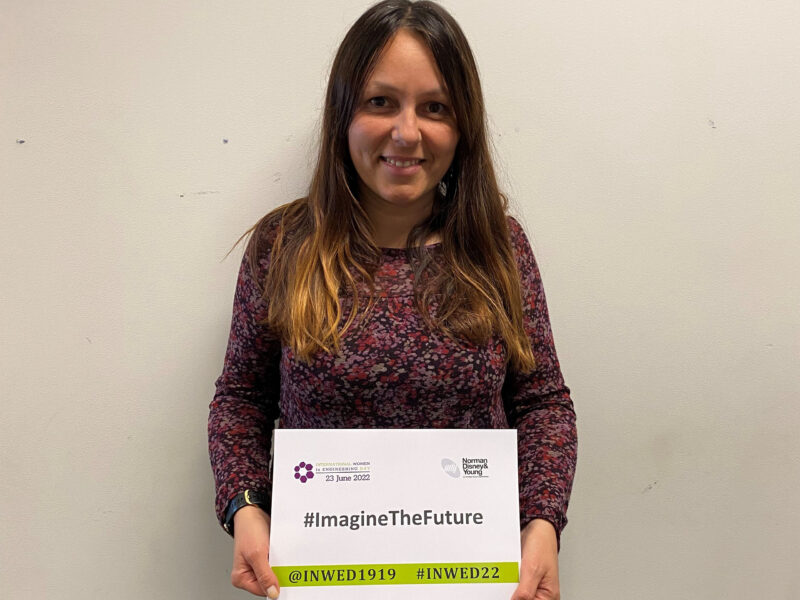
The hashtag this year is #ImagineTheFuture – what do you see the future of women in engineering being?
My niece is 22 and is currently in her 4th year of an Engineering Master, she wants to build rockets and be an Aerospace Engineer. What is our reaction to this statement? Is this extraordinary? Is this far fetched? Or is this somehow unrealistic if she ever wants to have a family? The future I imagine for her and the next generations is that those thoughts will be no more. We won’t need to talk about it, because equal access to work opportunities and remuneration will become normality, and girls wanting to be engineers will also be the new normal.
Why would someone at school/university want to go into engineering? What are the benefits of working in the construction industry?
As a Sustainability Consultant, my work relates directly to tackling climate change through transforming the construction industry. I believe the work engineers can deliver in this sector is extremely important to solve a lot of the issues relating to climate change and to ensure a safe future for our planet and people. The younger generation is concerned about their own future and the environmental challenges we are facing, stepping into a career in engineering represents an opportunity to tackle those challenges and contribute to building a different and sustainable society. The contribution of women in this matter is imperative.
What conversations are you going to have to support women in engineering?
It is only quite recently that I realised how much being a woman influenced my choice of career and the decisions I made in the late 90s, as a high school graduate. The choices I thought I had were a reflection of limitations caused by unconscious bias; going to university and becoming an engineer did not exist amongst the options I had available to me at the time. Supporting women in engineering is sharing my experience and to help them see what is on the other side of our blind spots, so there are less obstacles for them to choose engineering as a career.
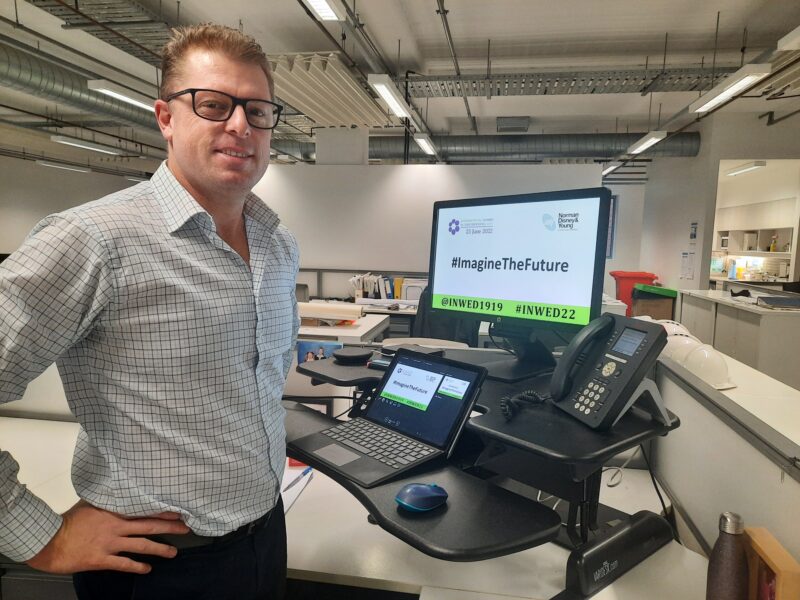
What are the conversations you can have with your daughter to encourage participation in STEM careers?
I am privileged to be bossed around by my 3 beautiful daughters who are growing up incredibly fast. I can already see their individual interests and capabilities developing and diverging, but when I talk to them about my job and my engineering projects, universally they call me a nerd and say; “your job is so boring Dad”. Over time they have developed a running joke about me being like Beaker from The Muppets and chant “Mee Mee Mee Mee” when I talk about maths, science and technology. Is this just normal behaviour? Or is this just my girls?
I talk to the girls about how important STEM careers are in the world, and how the consequences of STEM are fundamentally everywhere around us.
Why is gender parity important to you?
My daughters are learning that there are deep and long held cultural biases around females in STEM. One time I felt a little sick when my eldest said “boys are better at maths than girls”. How does this happen?
The hashtag this year is #ImagineTheFuture – what do you see the future of women in engineering being?
When I consider the #ImagineTheFuture theme of INWED in 2022, I am aspirational about the opportunities that the world will present my girls, and one where their talents and diversity can be appreciated and channelled in to positive and rewarding careers and lives. I am hopeful that society can break through some of the long-held biases and structural disadvantages that women face, particularly in their careers. Can we all do something to help make this better for women?
Representation of women in STEM matters, as my girls need to aspire to someone they want to be like. In my role working in an engineering practice, I’ve tried to help create exposure and opportunity for women, and have long supported running engineering students at work programs that target girls in year 10 – encouraging stem careers. We remain fundamentally underrepresented by women and we need our engineering women leaders to be visible to girls from a much younger age.
Despite the challenges that my girls live amongst and are figuring out, two of them have realised that they are developing a real interest in STEM; and love science and maths. Maybe there will be some future women engineers in my family. Whilst I have encouraged this whole heartedly, I may have also returned serve with a few “Mee Mee” impressions.
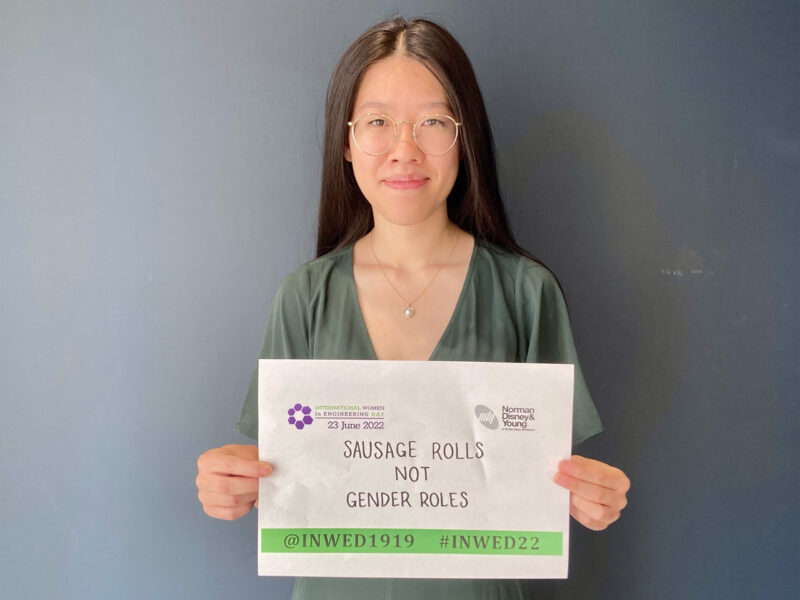
Do you have an example of someone you have worked with at NDY that has shown you why having female engineers is important to the workplace?
To produce designs that work for the end user, we need to understand their needs. One of the best ways to do this is to have a design team that is representative of the diverse workforces we are designing for. An example of this is the formula to determine standard office temperature which was developed in the 1960s around the metabolic resting rate of the average 40-year-old 70 kg male. This formula may overestimate female metabolic rates by as much as 35%, meaning that on average office temperatures are five degrees too cold for women (Perez, 2019). However, if the conditions are pleasant for one person, they may not question whether it is also pleasant for others; to get around this, we need to ask the right questions to get useful data and feedback from a representative group of end users.
The hashtag this year is #ImagineTheFuture – what do you see the future of women in engineering being?
In the future I’d like to see women in engineering being regarded as standard, such that we don’t have a need for a special day each year to celebrate women engineers or initiatives in place to overcome subconscious gendered bias.
What conversations are you going to have to support women in engineering?
I would love to have more conversations with other women engineers at NDY (including women from overseas offices) to widen our respective support networks, learn from each others’ experiences, and gain some representative role models in the process.
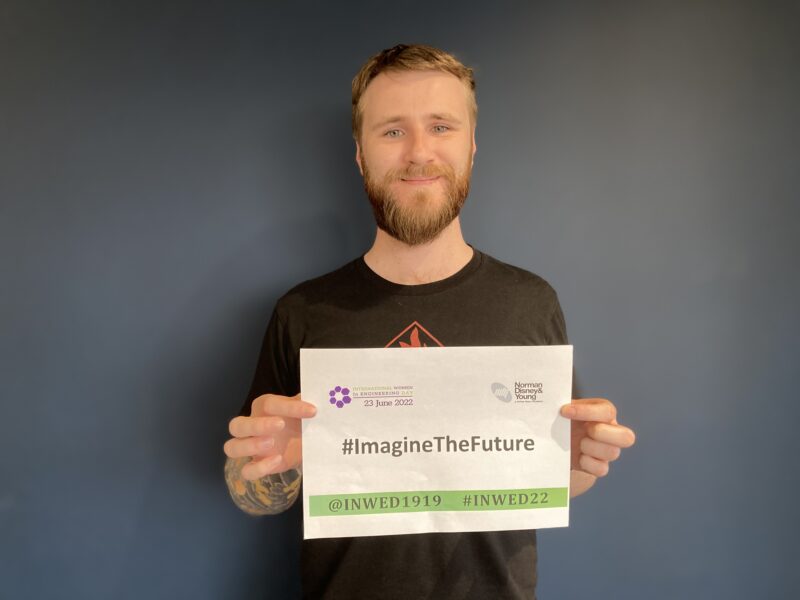
Do you have an example of someone you have worked with at NDY that has shown you why having female engineers is important to the workplace?
All of the women that I’ve worked with have shown me the importance of diversity in the workplace. NDY’s purpose is Making Spaces Work, to do that you need to understand how everyone will use the space, and as a design team you can’t consider all aspects of a design without first having the diversity in the design team.
Why would someone at school/university want to go into engineering? What are the benefits of working in the construction industry?
When I was at school I had little to no knowledge of the building services industry, and not being very good with “hands on” work I didn’t consider a role in construction for me. However thankfully I landed a job as a drafter and immediately had an appreciation for the technology used by the construction industry. As I progressed my career, the biggest unforeseen benefit of designing projects was that over time it accumulated, and all of a sudden I looked at the skyline of Sydney, and now London, and I feel like I’ve made a positive and lasting impact on these two great cities.
What are the conversations you can have with your daughter/niece to encourage participation in STEM careers?
It’s an absolute joy seeing my niece grow up, albeit over facetime for the last couple of years. She’s only 4 but with her mum being a dietician and her dad being a mechatronics engineer, I can already see a potential career in STEM for her. I’d encourage her simply by talking to her about the vast amount of opportunities there are when it comes to careers in science, technology, engineering and mathematics and letting her natural curiosity do the rest.
What conversations are you going to have to support women in engineering?
This is an ongoing conversation at NDY London, we’re establishing and refining clear pathways for all women in the business to progress their careers, we’re ensuring women are represented at all levels from graduates to executives and personally I plan on facilitating an open forum conversation for women and allies to gain a better understanding of the challenges and what can be done to make things fairer and more equal for all.
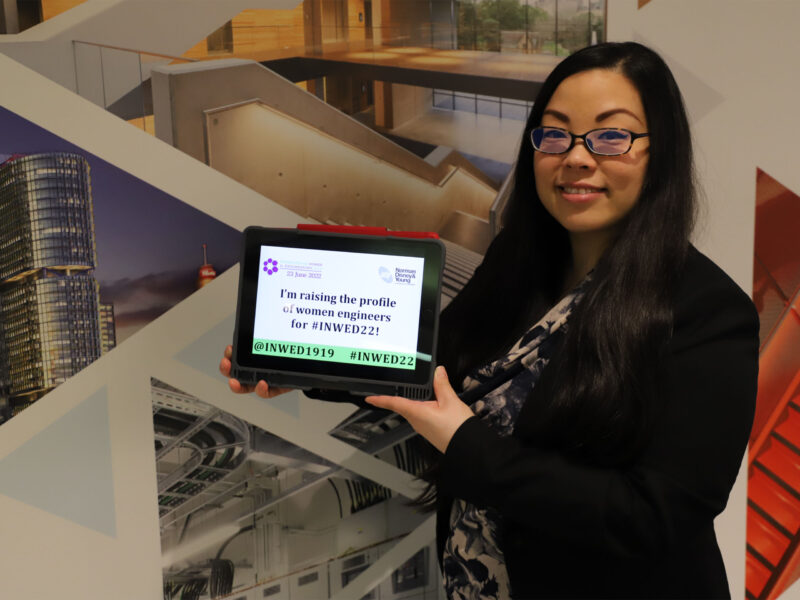
Why is gender parity important to you?
An inclusive workforce consistently provides better and more positive outcomes. When gender parity is a focus from the top down in an organisation, starting with the leadership, it helps to effect change, overcoming the inequalities and disadvantages women face. Increasing women in leadership and decision-making roles accelerates innovation, strengthening and broadening the industry through diversity. It is imperative to have diverse backgrounds, experiences and problem-solving approaches represented to increase the talent pool of capable individuals, break down gender stereotypes and contribute to a stronger world.
The hashtag this year is #ImagineTheFuture – what do you see the future of women in engineering being?
The future will be dynamic, empowered and more balanced as we see an increase in women represented in the industry at all levels of the workforce. This will succeed as leadership encourages flexible workplace solutions that focus on all facets of women’s lives including the balance of work and family. I envision a future filled with women engineers leading cross-national collaborations and managing projects with innovative solutions to the world’s current issues. Women in engineering will be the gateway to addressing international problems such as gender inequality, poverty and preservation of the environment.
What conversations are you going to have to support women in engineering?
It is important to me, both as a woman and as an ally, to be able to support women engineers through both conversations and actions. I aim to establish and cultivate business and personal relationships. I will not only encourage current women in engineering but also encourage young women who are interested in engineering to strive to become the next generation of our industry. It is important for women in male dominated industries to have access to an informal and safe space in which to be listened to, share experiences, discuss challenges as well as offer suggestions and provide encouragement to one another. I will facilitate connections among women engineers as well as women in all roles throughout Norman, Disney & Young, the wider Tetra Tech Group and my personal network to establish relationships.
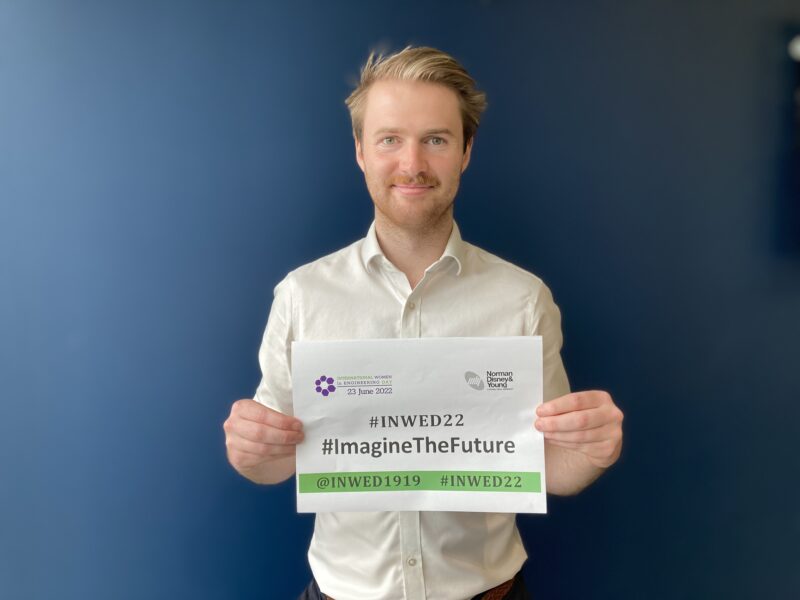
What are the conversations you can have with your daughter/niece to encourage participation in STEM careers?
Highlighting role models with which underrepresented groups can relate is key in inspiring a future representative work force required to tackle the challenges of a diverse population.
What conversations are you going to have to support women in engineering?
My belief is it is often about knowing when to let others lead the conversation.
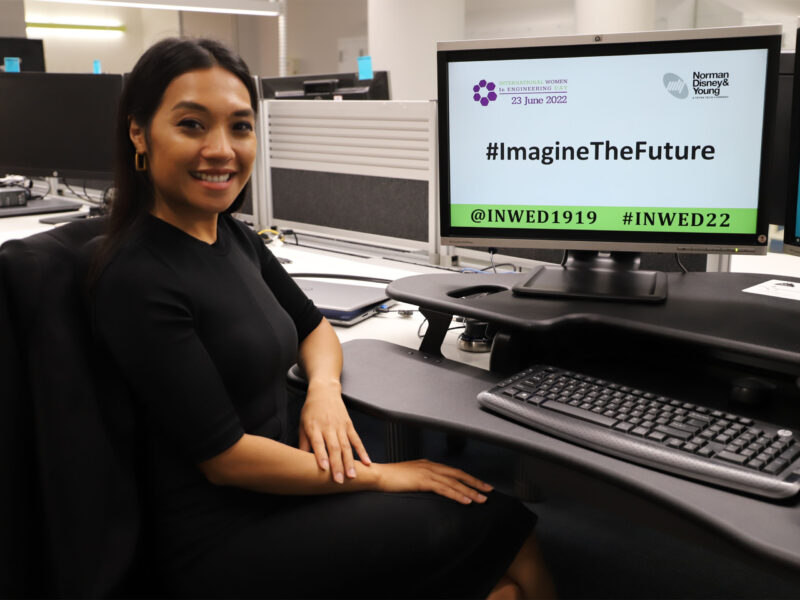
Why is gender parity important to you?
Achieving gender parity is important for workplaces not only because it is fair, but also because greater diversity makes our workplaces stronger.
The hashtag this year is #ImagineTheFuture – what do you see the future of women in engineering being?
There will be a renewed industry mindset prioritising talent or capability over demographics and background. With initiatives such as INWED existing to highlight women as a visible component in the construction industry, future female talents will realise that engineering and its allied professions are completely valid, rewarding career options for anyone regardless of their gender or background.
Why would someone at school/university want to go into engineering? What are the benefits of working in the construction industry?
Engineering and construction can provide a satisfying field of work, and a collaborative environment with constant learning curves that can help develop our creative/critical thinking and communication skill.
What conversations are you going to have to support women in engineering?
I would encourage women in engineering and construction not to hold back their knowledge and have faith in their abilities, and the value they bring to the table. And finally, encourage them to empower other women so we can all pave new roads to construction together.
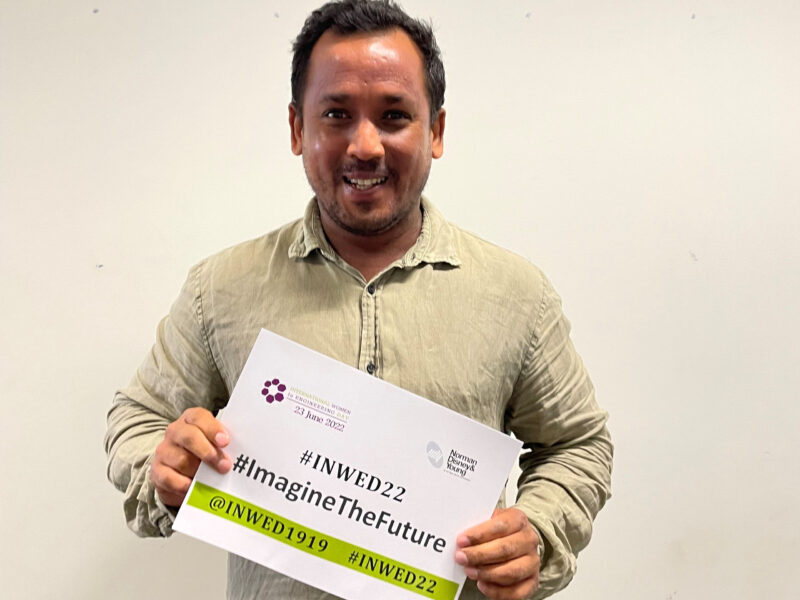
Why is gender parity important to you?
Everyone needs and deserves to be treated equally and offered the same opportunities. Women are just as valuable and important to our industry as men. I hope that one day the gender parity is not questioned and considered the norm.
The hashtag this year is #ImagineTheFuture – what do you see the future of women in engineering being?
I see women being able to pursue and achieve the same as men. I would like to see women being treated in the same way as men and given the same opportunities when they have the skills required to fill the roles.
Why would someone at school/university want to go into engineering? What are the benefits of working in the construction industry? What are the conversations you can have with your daughter/niece to encourage participation in STEM careers?
Engineering is challenging, interesting and can provide you with lifelong opportunities and memories. In any engineering role, you have the opportunity to make a positive impact because engineering involves making things better; whether it’s creating user-friendly software that saves people time or building a safer road to prevent traffic accidents. I actively show my daughter public projects that our company works on to help explain what engineering is about and the outcome of our work.

Why is gender parity important to you?
Gender parity is important to me because I believe it brings diversity of thought to the workplace and challenges the way things have always been done.
Do you have an example of someone you have worked with at NDY that has shown you why having female engineers important to the workplace?
For me, I feel that I am able to bring a different approach to problems that has been well received by others and helps them to learn and grow. I have also been able to work with other female engineers and other females in the business who have supported me in my career and played an important role as a sounding board for any challenges I face. I find discussing some issues I face with other likeminded females in the business has given me a safe space to discuss issues and understand that others have faced similar challenges.
The hashtag this year is #ImagineTheFuture – what do you see the future of women in engineering being?
I see the future of women in engineering growing and I have hopes that we get to the point where we no longer have to discuss it and business as usual is a workplace where gender parity is the norm.
What conversations are you going to have to support women in engineering?
I am going to continue to support other female engineers in the industry, being a part of the Diversity Equity and Inclusion working group at NDY has been important to me and I am always inspired by others in the committee and their passion for diversity (not just gender diversity) in the business. I don’t think I could have achieved as much in my career without the support of allies so I will be ensuring they also continue to support women in the industry.
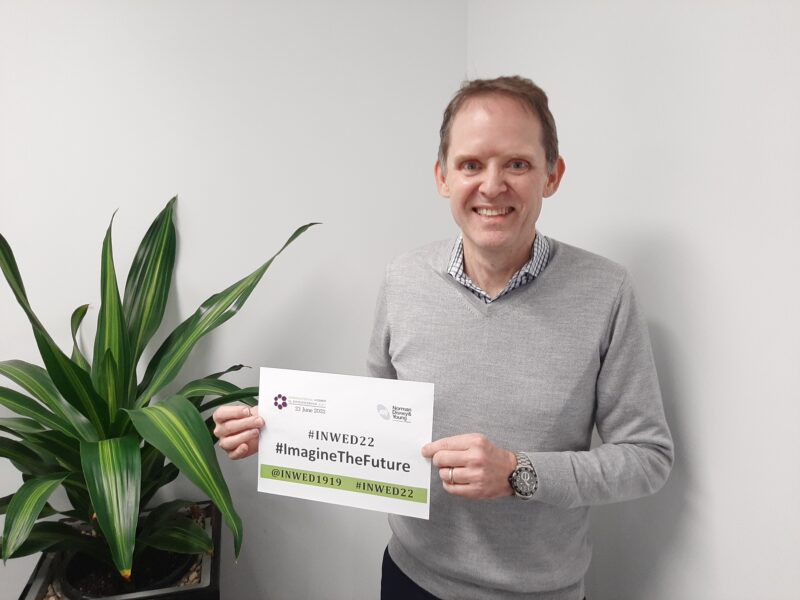
Why is gender parity important to you?
We need a greater gender equality to drive the industry forward for an innovative future and challenging the way we have done things in the past.
Do you have an example of someone you have worked with at NDY that has shown you why having female engineers is important to the workplace?
It has been pleasure working with two female mechanical engineers in the Brisbane office. Supporting them in their development and growth in the industry has been important to me. They are both leaders in their own way in the office and they keep the rest of the team on their toes.
The hashtag this year is #ImagineTheFuture – what do you see the future of women in engineering being?
A bright future with many opportunities in all facets of engineering.
What is the most innovative/exciting project you have done?
The QPAC new performing arts centre which is a 1500 seat auditorium which doubles the current number of theatres for a growing city to allow more than one production to be showing at once. It has a displacement system with a unique curved glass facade which will be a new exciting building in the entertainment precinct in South Brisbane.
Why would someone at school/university want to go into engineering? What are the benefits of working in the construction industry?
One of the most rewarding things about being a mechanical engineer has been seeing projects grow from concept to real life buildings and being able to look out the window of the office and see a number of buildings I have been a part of creating the Brisbane skyline.
What conversations are you going to have to support women in engineering?
I will encourage them to strive for their dreams and to not be afraid of challenges and take advantage of any opportunities which arise to further develop their careers.
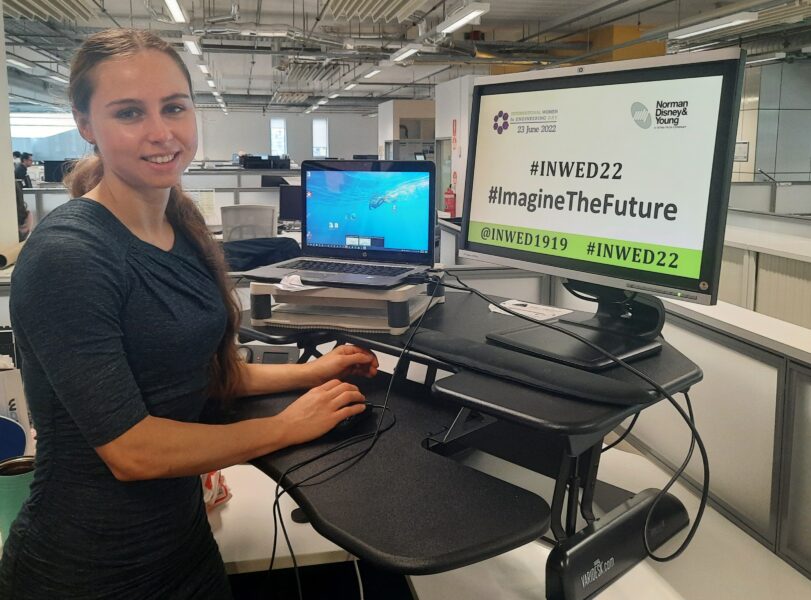
The hashtag this year is #ImagineTheFuture – what do you see the future of women in engineering being?
I hope to see the stereotypes that ‘STEM subjects are for boys’ and ‘engineering is a man’s job’ disappear. I expect to see women kicking goals in engineering roles at workplaces with an equal ratio of women to men.
What is the most innovative/exciting project you have done?
During the last couple of years, I’ve been working on an ~10,000 m² office building in Geelong. The project is quite innovative as the building is pushing the boundaries in terms of energy efficiency and the building’s structure is made of cross laminated timber and includes beautiful deep timber beams. This is the first major project which I have been involved in from the start of the design phase until the end of the construction phase, and it’s been so exciting to watch the design progress from sketches and 2D drawings to a real-life constructed building!
Why would someone at school/university want to go into engineering? What are the benefits of working in the construction industry?
I’d encourage anyone with an affinity with maths and science subjects to consider a career in the construction industry. As a mechanical services engineer, it’s so exciting and rewarding to see systems I design progress from sketches on a computer screen to a complete installation in a real-life building! I love being able to tell friends and family ‘I worked on that one’ when we’re driving past iconic buildings in the city. The job security provided by a career in construction is an added benefit; it’s comforting to work in an industry which will always be necessary to everyday life.
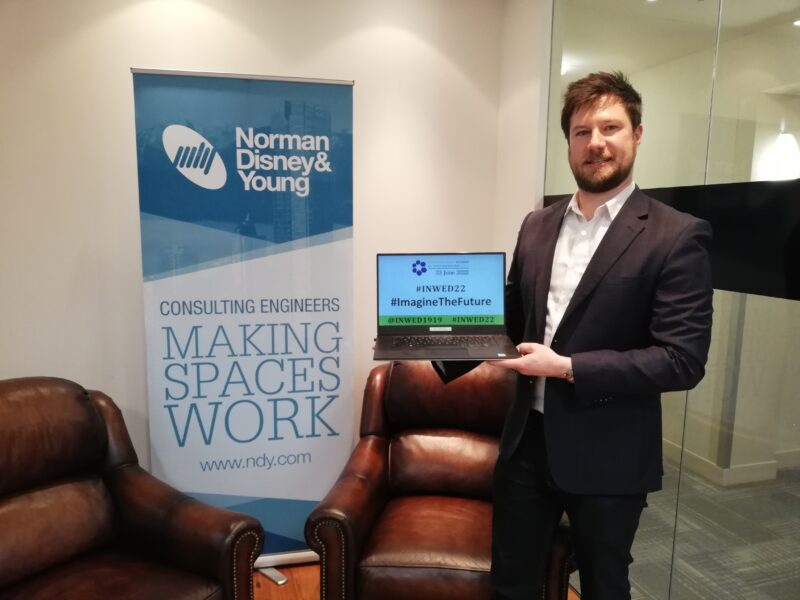
Do you have an example of someone you have worked with at NDY that has shown you why having female engineers is important to the workplace?
I have been fortunate to have had the opportunity to work with many talented female engineers. Each one has made unique contributions to our team in terms of their technical knowledge, contribution of ideas, leadership and the positive way they have enhanced our team culture.
Why would someone at school/university want to go into engineering? What are the benefits of working in the construction industry?
Engineering allows you to apply science to practically solve real world problems. In the construction industry, that means designing sustainable and energy efficient buildings that contribute to making the world a greener place.
What conversations are you going to have to support women in engineering?
We need to continue to have conversations about the various career opportunities and paths in our industry and support women in exploring any of these.
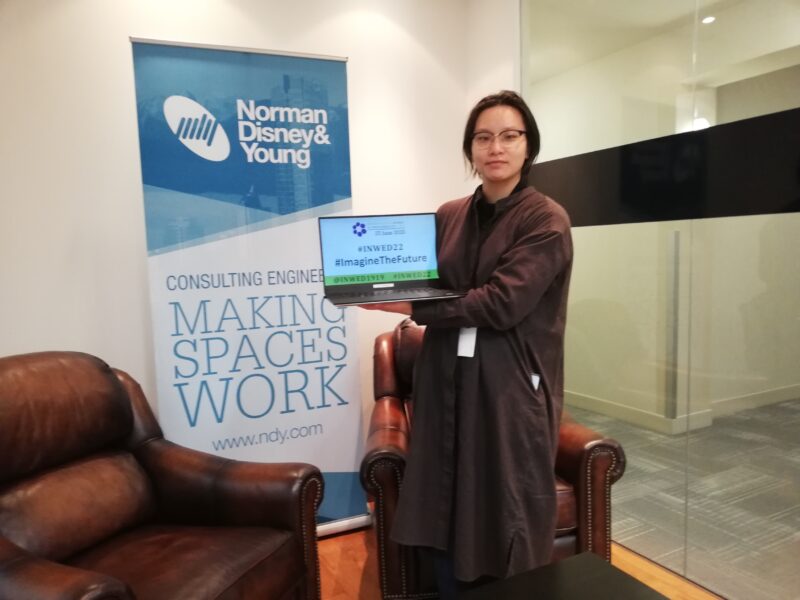
Why would someone at school/university want to go into engineering? What are the benefits of working in the construction industry?
Engineering gives you the skills to solve problems that you meet in life. The skills you learn at school are widely transferable and develop your critical thinking skills so you can succeed in non-engineering areas. The construction industry is unique as the projects you complete become a part of the public’s daily lives – construction projects have such a wide user base.
What conversations are you going to have to support women in engineering?
Don’t be intimidated to speak up and stand your ground against double standards or misogynistic behaviour.
Why is gender parity important to you?
It’s important because our world is so diverse and everyone has the right to contribute their voices to solve problems.




